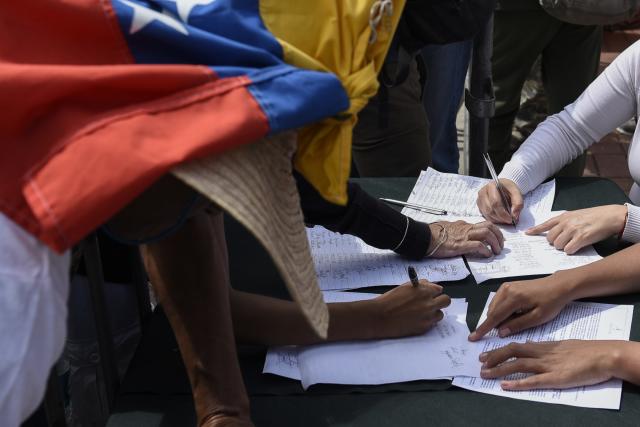
(Bloomberg) -- Venezuelan
opposition leader Juan Guaido has so far failed to sway the armed forces
to his side as he calls for elections that could unseat strongman
President Nicolas Maduro. But with every day that Maduro permits Guaido
to roam Caracas, holding rallies and building a government in waiting,
the Bolivarian revolution’s invincibility seems to decay.
“The more famous he becomes, the more power he amasses inside and
outside Venezuela, it becomes harder and harder for Maduro to jail him,”
Dmitris Pantoulas, a Caracas political analyst, said Monday. “Now, it’s
practically impossible.”
Supporters in the U.S., Latin America and Europe have hurried to
recognize Guaido, the head of the National Assembly, as the nation’s
rightful leader, and levied threats of sanctions or even military
intervention if Maduro moves against him. Guaido has named aides who
could oversee the country’s oil industry and whatever financial
resources remain after years of ruinous economic policy. But Maduro has
dealt out lucrative industrial franchises to top military officers and
Guaido must wrest the rank and file from their command.
Soft Measures
He has called for supporters to fan out Wednesday to distribute
copies of a legislative measure that would extend amnesty and
forgiveness to members of the armed forces who abandon the socialist
regime. The tactic exerts a steady pressure on Maduro, but even as the
president allows Guaido himself freedom, he continues to use violence
and imprisonment to perpetuate his power.
On Monday, a group of human rights organizations said at a press
conference that 35 people have been killed in demonstrations against the
president since Jan. 21.
“We have corroborated the number, with name, places and those
presumed responsible,” said Rafael Uzcategui, general coordinator of the
human-rights group Provea. The coalition, which also includes the Penal
Forum and the Venezuelan Observatory of Social Conflict, said that 850
people have been arrested due to the demonstrations, many taken at night
from their homes.
Quiet Talks
Still, the question now is about the depth of loyalty among the armed
forces, as Guaido taps the deep discontent in a country whose economy
has been wrecked by Maduro’s authoritarian brand of socialism. Critics
say that Maduro has essentially bought off the military, allowing money
laundering, fraud, illegal mining and other crimes.
Guaido told The Washington Post Sunday that he was in
behind-the-scenes talks with “government officials, civilian and
military men” and he is assembling a coterie of prospective government
officials.
#ÚLTIMAHORA #EXCLUSIVAEVTV LaConsul de Miami, Scarlet Salazar,
desconoció al usurpador Nicolás Maduro y reconoció como Presidente
Interino a @jguaido pic.twitter.com/mYxd8LOMRr
— EVTV Miami (@EVTVMiami) January 28, 2019
Maduro’s top military attache in Washington, Colonel Jose Luis Silva,
declared loyalty Saturday to Guaido. One of the consuls in Miami,
Scarlet Salazar, followed suit.
The talks for an essential shadow government are in the earliest phases but several people have been mentioned.
Most prominent is Ricardo Hausmann, a key economic minister in the
1990s who runs the Venezuela Project at Harvard. He is said to be
helping Guaido informally and has already drafted a plan to rebuild the
nation, from the economy to energy.
Shadow Government
Carlos Vecchio, a political coordinator from Guaido’s Popular Will
party, has been named business representative to the U.S. and met on
Saturday with Elliott Abrams, the new liaison to Venezuela for Donald
Trump’s administration.
Bond investors have taken note. Venezuela’s benchmark bonds due in
2027 have rallied to their highest since November 2017. Last week, the
U.S., Canada and most Latin American governments recognized Guaido as
the nation’s leader. The Bank of England denied a request this month by
Maduro’s cash-hungry government to pull $1.2 billion of gold out of its
vaults.
Critics caution it’s too early to predict any sort of success –
Guaido holds no palpable power over Maduro or the nation – but his
supporters nonetheless have been working to convince individual soldiers
to defect.
Congressman Ismael Leon and other Guaido supporters on Sunday walked
up to the gates of the army command building in the Caracas neighborhood
of San Bernardino and slipped copies of the amnesty bill through the
bars. The group asked the silent group of guards on the other side to
“not raise their weapons against those peacefully protesting.”
“They didn’t want to receive us,” Leon said. “But with their eyes
they told us they knew why we were doing what we were doing. They
understood us.”
A group of four national guards in the neighborhood of La Florida
said two people had come up to them in the morning and respectfully
described the law to them. The response was less friendly outside of
commands in El Paraiso and Petare, Caracas’ biggest slum, where reports
on local media show guards burning the copies that were handed to them.
--With assistance from Fabiola Zerpa and Ben Bartenstein.
To contact the reporters on this story: Alex Vasquez in Caracas
Office at avasquez45@bloomberg.net;Andrew Rosati in Caracas at
arosati3@bloomberg.net
To contact the editors
responsible for this story: David Papadopoulos at
papadopoulos@bloomberg.net, Stephen Merelman, Daniel Cancel
No comments:
Post a Comment